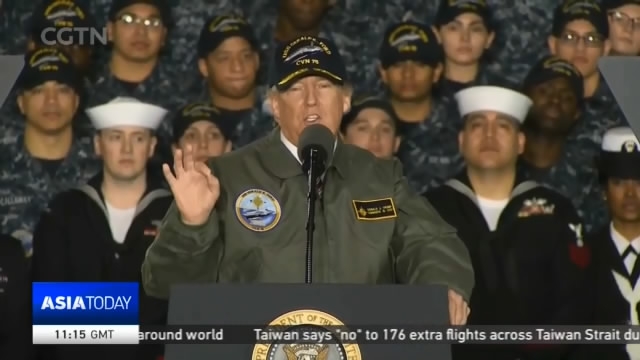
19:41, 20-Jan-2018
US Defense Strategy: China, Russia dismiss US military's new national security priorities

Russia and China are dismissing America's new national defense as "confrontational" and reflecting a Cold War mentality. On Friday, the US Defense Secretary singled out the two countries as growing threats. Natalie Pang tells us more.
The latest sign of American priorities moving on from focusing on Islamist militants.
JIM MATTIS US DEFENSE SECRETARY "We will continue to prosecute the campaign against terrorists that we are engaged in today, but great power competition - not terrorism - is now the primary focus of U.S. national security. We face growing threats from revisionist powers as different as China and Russia."
A spokesperson for the Chinese embassy in the United States said a Cold War mentality and zero-sum game mindset would only lead to conflict and confrontation. The spokesperson also said China adheres to a win-win strategy of 'opening-up' towards other nations, seeking global partnership, not dominance. He added that China further stands for democracy in international relations. The aim is to build a new model of global affairs, defined as "a community with a shared future for mankind".
Meanwhile, Russia's Foreign Minister Sergei Lavrov described the new US national defense strategy as "confrontational". He rejected US suggestions that China and Russia were undermining international efforts to strengthen global security.
President Donald Trump and his administration worry that the US military is feeling the effects of years of budget shortfalls, and needs a full reboot. Lavrov suggested that the new strategy reflected a campaign for "additional financial resources".
JIM MATTIS US DEFENSE SECRETARY "But we recognize no strategy can long survive without necessary funding and the stable, predictable budgets required to defend America. Let me be clear: As hard as the last 16 years of war have been, no enemy in the field has done more to harm the readiness of the U.S. military than the combined impact of the budget control act's defense spending caps.
In sheer spending terms, the United States' military outlay per year is still far more than either China and Russia. Washington spends nearly 6 hundred billion dollars per year on its military, almost three times the Chinese and Russian budget combined.

SITEMAP
Copyright © 2018 CGTN. Beijing ICP prepared NO.16065310-3
Copyright © 2018 CGTN. Beijing ICP prepared NO.16065310-3